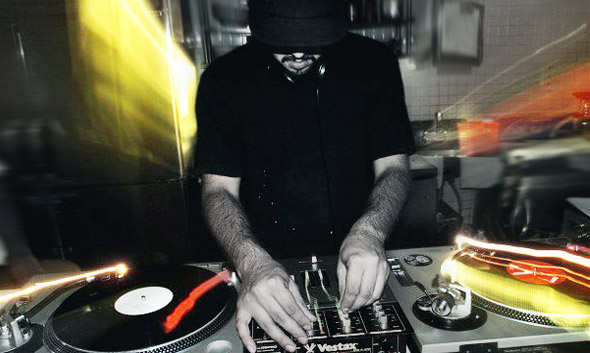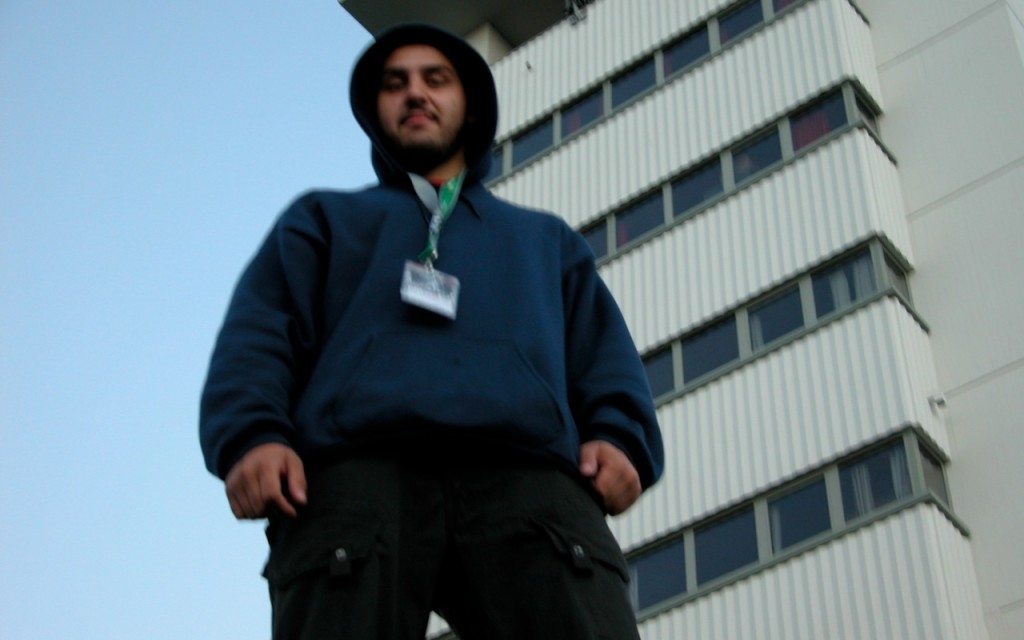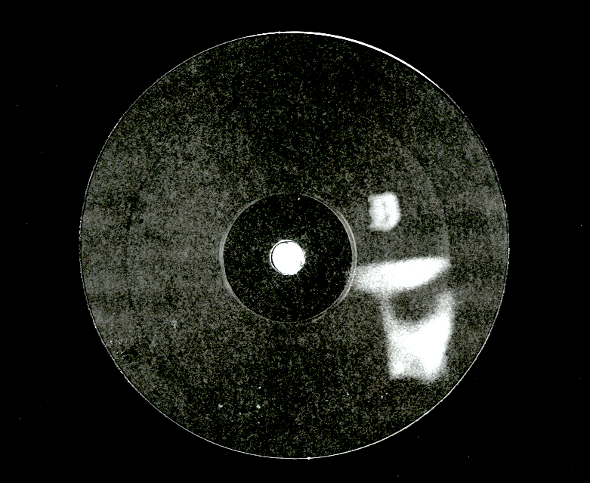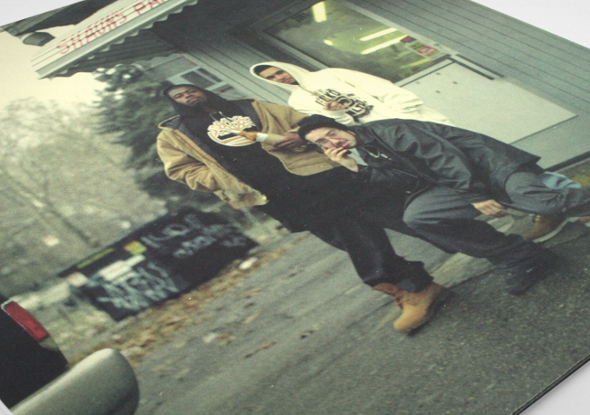MGUN: Sounds for the true music translators
 Last year saw Manuel Gonzales grace a succession of our favourite labels with his own distinct take on Detroit sound under the MGUN moniker – we despatched Brendan Arnott to track the producer down in his Detroit hometown.
Last year saw Manuel Gonzales grace a succession of our favourite labels with his own distinct take on Detroit sound under the MGUN moniker – we despatched Brendan Arnott to track the producer down in his Detroit hometown.
Looming behind Manuel Gonzales are hundreds of boxes of records, precariously stacked on top of each other, high enough that they look like they could topple. They’re not all his, though. He’s snuck away from his day at People’s Records in Detroit into the back room to talk, and provides a quick rundown of the shop owned by friend Brad Hales: “It’s a local record store, it’s one of the better ones in the city, specializing in soul 45s and of course, anything Detroit – house, techno, all that. I get a lot of stuff over here, I’m helping them out and I’m helping myself out at the same time.”
Earnestly positive, Gonzales radiates the infectious energy that categorizes his home of Southwest Detroit. Emerging as one of the first collaborators on Kyle Hall’s Wild Oats label, he quickly made a name for himself with the crushing raw analogue techno sessions of the abbreviated New School Nineteen Ninety Four Techno Project (NSNT PRJCT). Since then, he’s worked under the production name MGUN and graced UK label Don’t Be Afraid, Wild Oats and most recently Will Bankhead’s Trilogy Tapes imprint with his unique, sticky slow-motion acid-tinged techno.
But for someone with an ever-growing discography, much of Gonzales’ past is secluded from the internet, aside from small, cryptic press releases. Perhaps predictably though, he was raised in a household full of analogue hardware. “I was always interested in stereo stuff, turntables and tape decks and speakers and stuff. I grew up around it, my dad always had stereo equipment in the house.” Gonzales states, one of the several times his encyclopaedic knowledge of technology enters our conversation. “So, just messing around with different pieces of equipment got me interested in hooking stuff up and trying different things, like alternate ways of hooking a tape deck, recording off the radio, anything like that. Maybe a few years after doing that stuff, I had a little Casio keyboard, messed around with that for a while, got a four track, started diddling and dabbling with programs, and that’s kinda how I got started.”
Detroit’s eclectic radio scene also provided the impetus for Gonzales to get exposed to the hits of the time; “I’d listen mostly to the radio, anything like, the early 90s rap shows, like, the night mixes, they were broadcasting live from the club or some shit like that, a lot of booty mixes.” One thing that distinguished Detroit from other cities might’ve been the eclectic nature of radio in the pre – Clear Channel days. Gonzales reminisces that “you could hear techno, any day, at night on the radio. I can’t remember the names of the shows, but DJs like DJ Zapp and Gary Chandler were always playing”.
Educationally, Gonzales’ formative years got a boost from the Urban Arts Academy, also known as “The Hip-Hop High School”, funded through the Detroit Hispanic Development Corporation. “It focuses on the community in Southwest Detroit, and it’s a resource for everyone, not just Hispanics, but anybody in the community who needs help with stuff. If you wanted to know what to specialize in or go into in college, they were there for that too… and the school program I took part in, that was a one year thing. I don’t think they had any other funds to do anything after, so I got lucky to be a part of it. Music and media were a big part of the curriculum.”

One of the select few mystifying press details available about Gonzales was his touring Europe with Underground Resistance’s Interstellar Fugitives collective. How did a young twenty something South Detroit youth get to tour throughout the Netherlands and Norway with one of the most influential techno collectives on the planet? Fittingly enough, it all resulted from a house party and a connection Gonzales formed through the arts program at DHDC. “I had (local Detroit DJ and Urban Arts Academy teacher) DJ Sicari teach me a lot of stuff, how to scratch, basically.” he recalls.
“I mean, I knew how to DJ before, but my mixing and blending weren’t as tight until I met this guy. So I’m hanging out with this guy and he thinks I’m a cool dude or whatever, so we’re going to parties and stuff, and he brings me to a house party where some members of Underground Resistance were. Y’know, Mike Banks and those guys were hanging out, and I was talking to those guys, Cornelius, I was talking to him, and we kinda just hit it off. I demonstrated some of my skills and I had enough of them to get the party going at least, so I worked stuff out with them and y’know, toured with them overseas.” His voice still has an element of disbelief and amusement in it as he recounts it. “It was like a regular little house party, just going’ around, making rounds basically.”
You could call Manuel’s “eye opening” touring experience a testament to the close-knit artistic community of Detroit, where he speaks casually about future emerging collaborations with Kyle Hall, and how he’s interested in linking up with FXHE house juggernaut Big Strick at some point “if we run into each other.” Gonzales speaks about working together in Detroit as a casual inevitability, as if he’ll run into Omar-S at the pizza shop down the block sooner or later. His first collaboration with Kyle Hall certainly formed organically, their interconnected social circle eventually leading Hall to casually ring up Gonzales and enquire about collaborating.
The resulting Laygo My Faygo EP has the kind of unhinged, raw creativity that only a giddy jam session could generate – twisted whistling patterns reverberating amongst murky mixture of claps and haywire synth lines. It’s the sound of paint thrown on a blank canvas, what Kyle Hall calls “taking concepts from things that seem like nothing, and making it our own.” Gonzales describes NTST as “obscure music, real synthy. We were just going completely into left field, it’s still dance music I guess, but we were just trying to stretch it out as thin as it’d possibly go”.
The idea of a concept stretched can also be applied to the way Detroit techno has been interpreted and repackaged by the rest of the globe. In the midst of vinyl’s resurgent popularity, the city holds a revered position as worldwide shrine to the dusty, soulful analogue funk. Detroit veterans like Theo Parrish and Moodymann have objected to the constant commodification of Detroit music in the past, so what does Gonzales make of the rapid consumption and replication of Detroit’s musical output?
His eyes light up without a trace of spitefulness. “I mean, I think it’s kind of fucking funny man” he says casually. “I mean, there were guys here before me… they might feel a bit differently than me. I feel like, hmm… maybe if they like it that much that’s just how it is. They just feel like they owe us something, they get something out of Detroit, like a homage. In a 2007 interview with the Wire magazine, Underground Resistance’s Mike Banks echoes the sentiment Gonzales speaks of, comparing world-wide adoption of techno to the state of Detroit’s automotive industry: “What used to be your territory only, now is shared by many.”
Underground Resistance’s ethos to music-making was always conceptually connected to ideas of militancy. Simon Reynolds called them a “techno Public Enemy” fostering their own sonic autonomy. Is this true for Gonzales’ output as well? Does his music explicitly or implicitly tackle politics? “Not in the least bit” he assuredly replies. “I just make it to express something that’s on my mind in the moment. It’s dance oriented, so it’s mostly for parties… and thinking, and creating an atmosphere. But it’s not too political; I don’t focus on anything like that.” If not politics, where do the ideas for Gonzales’ work come from?
“It’s really different all the time, definitely. It’s all about how I’m feeling that day, or maybe something just happened, sometimes maybe some shit went down, I might go right into producing with the idea of making something distinctly related to my mood, that emotion might go directly into the track. It definitely depends on what’s going on that day.” As for whether DJing informs his production ethic, Gonzalez is conflicted. “Maybe not really, I don’t think so – well… I guess maybe I’m thinking ‘this could work for a dancefloor, or this could be something just for listening’, but not too much.”
MGUN’s Upstairs Apartment EP for London’s Don’t Be Afraid imprint is a perfect example of this bi-polar creativity in effect. “Gas Chamber” merges rapid-fire percussion, hectic high-hats, a frenetic stomp full of grimy urgency which Gonzales says was “trying to go back to those days where it was like fucking, warehouses and strobe lights”. In contrast, “Westerns” sounds like it exists in a different Universe, as if someone hooked an episode of “Bonanza” up to a sentient fleshy computer. When pressed for specifics about how these tracks were created, Gonzales spills a bit of his production routine. “I think my whole idea of the main synth sound in “Westerns” was based around a mouth harp thing, so I was kinda thinking of a caravan wagon- somebody playing one of those mouth harps like you’ve got in Westerns. It just came to me all of a sudden, I was messing around with a wa-wa pedal, and a few synthesizers and echo effects, or delay, and that was the result.”
His track titles are often also creations of his subconscious. After combing the internet unsuccessfully attempting to find out what track name “Flutter’s Brother” from his most recent EP on The Trilogy Tapes, The Near Future, is referencing, I confront MGUN about where the esoteric title is from. He laughs in response. “It’s not a reference to anything man, I was just sitting around being weird, that’s how the tracks get named. Someone might call me on the phone and I’m talking to them, and they say one little word and I’ll be like, ‘OK, that’ll be the name of what I’m working on right now.’ That’s how it goes.”
And what about the weird, unsettling vocal sample buried within the track? “That wasn’t a sample at all, that was me, talking into whatever the hell I was talking into.” He pauses, remembering. “I think I had a flanger pedal that was going dead, or I had a voltage that was too low and wasn’t the correct voltage, so it actually turned the flange into a weird kinda delay with a high pitched frequency thing on it. Sometimes these things come from a specific inspiration, sometimes it’s just jam sessions though, where the final product ends up sounding completely different from where I started.”
 One thing’s certain though, Gonzales is straightforward about his love of analogue sounds. “I definitely prefer hardware man, the software shit confuses me, I kinda stay away from it.” This seems in line with the Harmnear EP press release, which proclaims, “this piece is intended for the TRUE Music Translators and NOT the fly by night laptop jock.” Asking Gonzales about his thoughts on digital vs. vinyl, and whether or not he was responsible for the catchphrase “laptop jock”, he smiles. “I dunno who wrote that, but it was funny.” He pauses briefly. “I’m thinking records will always be here, right now, as you can see”, gesturing to the mountain of stacked boxes of records adorning the room behind him. “I’m amongst thousands of records. I think those will be here for a long time. And y’know, I’ve seen too many laptops crash when people are doing their live shows, or if someone’s using Serato, I’ve seen it stop mid-set. But the only thing that stops the record is skipping. It’ll keep rolling and the party will keep going no matter what.
One thing’s certain though, Gonzales is straightforward about his love of analogue sounds. “I definitely prefer hardware man, the software shit confuses me, I kinda stay away from it.” This seems in line with the Harmnear EP press release, which proclaims, “this piece is intended for the TRUE Music Translators and NOT the fly by night laptop jock.” Asking Gonzales about his thoughts on digital vs. vinyl, and whether or not he was responsible for the catchphrase “laptop jock”, he smiles. “I dunno who wrote that, but it was funny.” He pauses briefly. “I’m thinking records will always be here, right now, as you can see”, gesturing to the mountain of stacked boxes of records adorning the room behind him. “I’m amongst thousands of records. I think those will be here for a long time. And y’know, I’ve seen too many laptops crash when people are doing their live shows, or if someone’s using Serato, I’ve seen it stop mid-set. But the only thing that stops the record is skipping. It’ll keep rolling and the party will keep going no matter what.
When prompted for his thoughts on dance music in 2012, Gonzales remains honest but optimistic. “I feel like it’s gone a lot of different ways. Even if I don’t like it, it’s definitely going different places, it’s getting really poppy… I don’t know man, I guess it’s like there’s a little bit of electronic dance music for everybody now.” Whereas others might take the opportunity to insert a few snide remarks about EDM, there’s nothing judgmental about Gonzales. He’s equally unflinchingly polite about the weekend influx of Detroit Electronic Music Festival-goers that pour in, and abruptly out, of Detroit. “I definitely have positive feelings about DEMF, I’ve been going ever since the second one, and yeah, you get a certain feeling when you go there, and it’s genuinely great. I see that a lot of the people that come down, they’re definitely not around here the other parts of the year, they’re just down here to enjoy themselves… and that’s what it is, y’know, like, ‘party it up man!’ Even if it’s just that one time of year, it’s still worth coming down.”
For Gonzales, Detroit is still buzzing the remainder of the year. “It’s definitely creative around here, there’s always these little intimate parties now, like, little house party scenes. For example Fundamentals (Kyle Hall and Jay Daniel’s new monthly night) is a Motor City Wine event, it’s a pretty low key spot, it’s real mellow, but they pack the house, real intimate. I think it’s real good like that, you don’t need a big venue to do this shit, you get people close together and people start knowing each other too. There’s always a group of people around, that it’s good to be around them basically.”
Concepts of community and daily life feel prevalent on The Near Future, a brilliant eclectic six-track release that shows off an astonishing range of creative impulses: one moment moody and ambient, the next deep, dark and unrelentingly danceable. Immediately striking is the photograph on the front cover, a worn-down scraggly brick convenience store, the words “Ode to summer…” tagged in graffiti on the front. On the flip side, three young men are standing on a rain soaked sidewalk mid-pose, answering a cell phone, looking tough, holding a beer in a paper bag. It feels like it was pulled directly from Gonzales’ community, and it turns out it was.
 “I definitely took the picture” he states. “That was kind of a side project at school. I had an art teacher who was also a photographer, and I was telling him about this camera I had, this old Japanese thing, maybe my grandfather brought it back from when he was in the war or something… so it was hanging around the house, I was like, ‘check this thing out’, and he was like, ‘hey, I’ve got some film for that’ and he gave me this film, loaded it and showed me how to use it, and I just ran around taking pictures of stuff I thought was pretty cool. So the whole summer I was doing this, and my boy tagged on that store, and I was like, ‘yeah, I’ve gotta get a picture of that’. And then the flip side is some friends and my brother, in front of the local party store, which is on the street we still live on.”
“I definitely took the picture” he states. “That was kind of a side project at school. I had an art teacher who was also a photographer, and I was telling him about this camera I had, this old Japanese thing, maybe my grandfather brought it back from when he was in the war or something… so it was hanging around the house, I was like, ‘check this thing out’, and he was like, ‘hey, I’ve got some film for that’ and he gave me this film, loaded it and showed me how to use it, and I just ran around taking pictures of stuff I thought was pretty cool. So the whole summer I was doing this, and my boy tagged on that store, and I was like, ‘yeah, I’ve gotta get a picture of that’. And then the flip side is some friends and my brother, in front of the local party store, which is on the street we still live on.”
Is there a thread that ties The Near Future together? “They kinda don’t have anything in common; I think it’s just like a little taste, a collection of the stuff that I’m capable of doing production wise.” Becoming serious, Gonzales states: “Like, this selection is the near future, this is what you can expect in our work.” Then, lightening up again: “and the artwork really didn’t have anything to do with it otherwise than that it looked cool.” Nowadays MGUN’s sound is influenced by “industrial, new wave, and German minimalist stuff. Lately it’s been the 70s, and earlier, definitely a lot of earlier stuff these days.”
What does the near future hold for Manuel Gonzales? Exuding an easygoing confidence, he’s hesitant to make promises, stating instead that “I’d rather wait and see how things develop”. We talk briefly about how walking into a record store and finding new releases that arrive with no forewarning is its own unique euphoric rush. “I kinda like that spontaneity” he says reflectively. “like, bam – there it is. I’m trying not to hype it up too much.” Like the stack of records eclipsing Manuel, the future is looming.
Brendan Arnott
Header image by Ilaria Pace